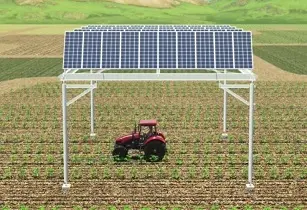SolAgra has recently contracted with the University of Delaware (UDel) for two agrivoltaic solar arrays that will be built at UDel’s Newark and Georgetown campuses
These solar arrays are planned to be built and launched for the 2024 growing season, with facilities giving access to students and faculty of the College of Agriculture and Natural Resources, and offering them an opportunity to study the benefits of co-locating solar tracking systems with crop production.
The test crops will mostly comprise of high-value fruits and vegetables like tomatoes, peppers, lettuce and strawberries that are currently bearing the brunt of climate change. Faculty and students in the College of Engineering and Institute of Energy Conversion will gather data on solar electricity generation. Any mutual benefits demonstrated will highlight the potential of using agricultural land for large-scale dual-use PV installations.
SolAgra, which calls its patented technology SolAgra Farming, uses patented elevated solar arrays to produce green energy on farmland while simultaneously sustaining or improving the quality of crops being grown beneath the solar arrays. This unique agrivoltaics technology provides DynamicShifting and CounterTracking of elevated solar arrays to support the dual use of farmland.
Moreover, the company’s Solar Platform and its hinged design not only allows multiple configurations for a plethora of crops, but also controls the mobility of the structure to help regulate the location of sunlight and shade landing on the field. This allows farmers to control the amount of shade the crops receive while maintaining solar power production.
In addition to enjoying the shielding from excess sunlight, rain and hail, the farmers are also entitled to receive a portion of the power sales revenue from SolAgra in lieu of land-lease payments.
"UDel is really excited to be partnering with SolAgra to be the first demonstration site for this new type of agrivoltaic system,” said co-PI, Steven Hegedus, an electrical and computer engineering professor and senior scientist at UDel's Institute of Energy Conversion. “Two of the greatest challenges for the future are providing clean energy and food in a changing climate. It makes sense to find a common solution.”
For more information, visit: https://solagra.com





